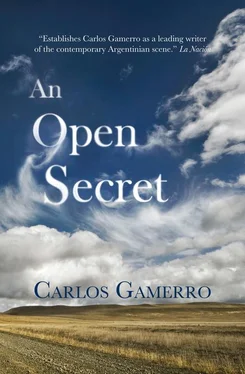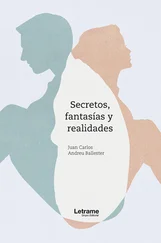“AND ONE FINE morning I remember it was dead hot and the day starts with more hustle Subsuperintendent Greco’s in and out of the Super’s office and calls are coming in from Rosario and word starts going the rounds from office to office — it’s today. But only then in all the toing and froing does the Super answer someone as stops him with a blink and this is it, confirmed from one end of headquarters to the other, particularly when he calls in Sergeant Chacón and says to him Sergeant he says to him put a couple of officers on Ezcurra’s tail if he takes a dump I want to know about it and by noon that day which was well never mind a … wait gimme a second Wednesday no Thursday—”
“Friday,” intervenes Nene Larrieu from his post behind the bar.
“Friday, that’s it. Don’t miss a trick you don’t do you eh Nene? Had to be a Friday or Saturday ’cause of the show at the lagoon. Bet you don’t know who was on that night? If you don’t believe me ask them. Know who was on? Tell him Nene.”
“He already knows,” the memorious waiter clarifies.
“Sandro, that’s who. The Gypsy Man in person. Just picture what this town was like in them days, I don’t mean like Buenos Aires but just picture it. So anyroad as I was telling you by noon Friday the news had spread and the whole town knew didn’t they. The dog’s day’d come.”
“HE WAITED LIKE THAT TOO,” Nene Larrieu said to me a few days ago, when, bored of my daytime zapping in Guido and Leticia’s kitchen and not feeling like going over to the factory to borrow their creaking computer for a while, I wandered over to Los Tocayos in the hope someone would turn up, ‘that dog’s day’ as they call it, for his mates Los Jaimitos to come. They’d already stood him up at the lagoon and he came in early to see why. Maybe something’s happened to one of them? he said to me at one point and I couldn’t stand it any longer and I said, I said to myself, I’ve got to tell him and God’s will be done, when I see a patrol car going past behind him without him noticing, crawling along like this past all three doors and through the last one Chacón the one who now owns the kiosk next door and was sitting in the back puts a finger to his lips. Ezcurra didn’t notice a thing. Sat there waiting for quite a while but word must’ve got around that he was here ’cause not a soul came in the bar and it must’ve been around eight I reckon he said I’m off home for a shower before the show, let the lads know if they’re looking for me and he left through that door over there. And that was the last time I saw him.”
“SHEER COINCIDENCE,” exhaled Jaimito, Sacamata junior soon after arriving, feigning a bodily relaxation belied by the cold gleam in his eyes and the rictus of his mouth. “Bermejo was away on business in Rosario that day, I had my old man down with otitis I think it was and had to look after the store, and my friend Beto here … What was it you had on?”
“Had to take Mamá to the specialist in Toro Mocho. She was in a really bad way by then,” and he added unnecessarily in a barely audible voice: “Died a year later.”
“You see?” boomed Sacamata in confirmation. “We liked a good time it’s true, but we weren’t kids either. Bermejo was pushing forty, you and me were going on for thirty, and Ezcurrita was around …”
“Thirty-four,” I beat the infallible Nene Larrieu to it.
“Didn’t I tell you Beto? If he carries on like this our friend Fefe here’ll end up knowing Ezcurrita better than any of us. That’s what I’m saying, we weren’t kids, we all had responsibilities. Not Ezcurra of course, he was our very own Isidoro Cañones, he could afford not to. But the rest of us had work obligations or family obligations, like Beto with his late Mamá. I mean the razz is the razz and graft’s graft right? That’s something Ezcurrita could never grasp.”
“I couldn’t say anything to you in front of Batata ’cause he still goes crazy nowadays if anyone dares to insinuate,” Iturraspe whispered when we were alone, “but what you’re thinking’s the truth. We did everything we could not to run into Ezcurrita all day. It wasn’t ’cause we were scared — least not in my case — it was ’cause we were embarrassed. If I hadn’t told him anything by then how would I find the face to tell him now? He’d never forgive me for not warning him earlier. What if nothing happened and I’d burnt my boats with him over nothing? I clung on to that hope, it was my last card … There were so many reasons to be hopeful. I don’t think Neri thought about it beforehand, too Machiavellian for a cop’s brain, but paradoxically enough the result of his enquiries was to convince everybody that he wouldn’t do anything in the end see? His bark’s worse than his bite people were saying, so we inadvertently gave him the go-ahead …”
“You were his friends,” I opined.
Iturraspe automatically opened his mouth to speak but no sound came out. All his vanished eloquence rose to his eyes. I changed the subject as a mark of gratitude for his silence.
“IF ANYONE sent him a letter as they say …”—the pharmacist Don Mauro Mendonca had seemed to hesitate—“it wasn’t me. I phoned him. He answered and I quickly outlined the situation for him and suggested that the best thing he could do was to leave town for a while, and the province too to be on the safe side. Then I hung up.”
“You didn’t tell him who you were?” I couldn’t help asking, knowing full well the answer would be:
“Are you mad? Knowing what a blabbermouth Ezcurra was the first thing he’d do would be to tell the whole town I’d told him. I did what morally I had to and warned him that’s all. The others didn’t even do that.”
“LOOK HERE KIDDO,” says the last Jaimito, Bermejo, a fifty-something mahogany-dyed Pappo clone in black leather jacket and dark glasses to match the daytime half-light of his locked, empty nightclub. Through the black-painted windows comes the busy sound of traffic and pedestrians with which the not-quite-town of Fuguet does its best to drown the memory of the days when the Agrofé farm machinery and equipment factory was open and they vied with Malihuel for its administrative supremacy of the county. “I agreed to see you ’cause Beto Iturraspe, who’s a friend of mine, asked me to, but to be honest the less you remind me of the better. If there’s one thing I don’t regret in my life it’s leaving for good, don’t know how I stood the place for nearly fifteen years. This may not be New York but at least they let you work, and live as well, which is a luxury in itself. I’m a believer,” he says, tugging at a thick silver chain and disentangling a little medallion of the Virgin Mary from the others — a swastika, a yin-yang and a Megadeath skull nestling in the fuzz of his chest — then kissing it, “but I couldn’t set foot inside the church there without being a dartboard for Father Raneri’s sermons,” he says and I stifle a remark about his pitted cheeks being proof of the current Malihuel priest’s excellent aim. “So as you might’ve guessed I don’t find the idea of this little chat very exciting, nothing personal I can assure you but still … What do you wanna know?”
I tell him. He shakes a crumpled pack of black Particulares under my nose until a reluctant cigarette pokes out. I decline. He lights up.
“Ezcurra was a burnt offering,” he exhales, “and anyone as tried to save him was going to drown with him,” he continues, his composure apparently immune from the almost physical way his metaphors cancelled each other out. “’Specially me. Superintendent Neri wanted to run me out of town so he’d get the holier-than-thou female vote. Twice the pigs raided my place with people inside, trumped up one charge for drugs they did and another for underage drinking, it sucked up the month’s profits to pay off a shyster and get myself off the hook. Not to mention the money for the first to the fifth.”
Читать дальше












